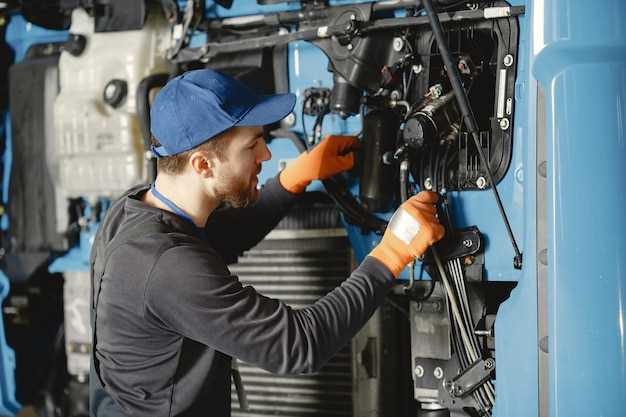
Electrical issues in work trucks can significantly disrupt operations and lead to costly delays. Understanding the wiring and system layout of these vehicles is crucial for identifying and resolving problems efficiently. Proper maintenance and early detection of electrical faults can prevent minor issues from escalating into major repairs.
The electrical system in a work truck consists of various components such as batteries, alternators, and fuses, all of which are interconnected through complex wiring. Regular inspections of these elements can help ensure optimal performance and reliability on the job site. For fleet managers and operators, having a systematic approach to diagnosing electrical issues can save both time and resources.
By gaining proficiency in the common symptoms of electrical failures, such as flickering lights or inconsistent power supply, personnel can more effectively troubleshoot problems. This knowledge not only improves the longevity of the equipment but also enhances overall safety, making it imperative for those in the industry to prioritize electrical maintenance in their operational protocols.
Identifying Common Electrical Issues in Truck Wiring
Electrical problems in truck wiring can lead to significant operational issues and downtime. Understanding how to identify these problems is crucial for efficient troubleshooting and maintenance. Here are some common electrical issues found in truck wiring systems.
1. Damaged Wiring Insulation: Over time, wiring insulation can wear down due to exposure to environmental factors, abrasion, or heat. This damage can result in short circuits and electrical failures. Inspect wires for fraying or bare spots and replace them as needed.
2. Corroded Connections: Corrosion can occur on connectors and terminals, especially in harsh weather conditions. This affects the electrical flow and can cause intermittent issues. Regularly check and clean electrical connections to ensure they are free from corrosion.
3. Loose or Disconnected Wires: Vibration and movement can cause connections to loosen over time. Loose wires may lead to inconsistent electrical performance. It is essential to regularly inspect connections and ensure they are securely fastened.
4. Faulty Grounding: A poor ground connection can lead to various electrical malfunctions in a truck’s wiring system. Check grounding points for cleanliness and secure attachment. If grounding is inadequate, it may result in erratic behavior of electrical components.
5. Blown Fuses: Fuses are designed to protect truck wiring from overcurrent situations. A blown fuse indicates an underlying electrical issue. Ensure that the correct fuse rating is used and investigate the cause of the blown fuse to prevent recurrence.
6. Wiring Harness Issues: The wiring harness is a critical component that connects various electrical systems. Damage or wear to the harness can disrupt multiple systems simultaneously. Inspect the harness for signs of wear, cracks, or breaks and address any issues promptly.
By recognizing these common electrical issues in truck wiring, operators can effectively diagnose problems and maintain the functionality of their vehicles. Regular inspections and preventive maintenance are key to ensuring reliable electrical performance.
Troubleshooting Techniques for Electrical System Failures

When dealing with electrical system failures in work trucks, effective troubleshooting is essential to identify and resolve issues promptly. Start by conducting a thorough visual inspection of the truck’s wiring. Look for signs of wear, corrosion, or fraying that may indicate potential problems. Pay special attention to connectors and terminals, as these are common failure points in electrical systems.
Next, utilize a multimeter to measure voltage levels at various points in the system. This helps determine if the power supply is functioning properly. Begin at the battery and move along the circuit to ensure that voltage is consistent where it should be. If there is a significant drop in voltage, inspect the wiring for breaks or poor connections.
Another effective technique is to check for ground issues. A poor ground connection can lead to a multitude of electrical problems. Use a wiring diagram specific to your truck model to trace ground wires, ensuring they are properly connected and free from rust or dirt.
For more complex issues, isolate components by disconnecting them one at a time. This method can help identify faulty parts without taking the entire system offline. It is useful when trying to pulse-test switches or relays, as testing them individually can reveal whether they are functioning as intended.
Document your findings throughout the troubleshooting process. Keeping track of any irregularities can help in identifying patterns, which may point to underlying wiring issues or systemic failures in the truck’s electrical system. By methodically addressing each segment of the wiring and components, you can efficiently identify the root cause of electrical problems in your work truck.
Preventive Maintenance Tips for Work Truck Electrical Systems

Regular preventive maintenance is essential for ensuring the reliability and longevity of the electrical systems in work trucks. By implementing a routine maintenance schedule, you can identify potential issues with the wiring and other components before they lead to significant problems.
1. Inspect Wiring Regularly
Check the wiring for any signs of wear, corrosion, or damage. Look for frayed wires, loose connections, and insulation deterioration. Ensure that all connections are tight and secure, as loose wiring can cause electrical shorts or failures.
2. Clean Electrical Connections
Corrosion can build up on electrical connectors, leading to poor performance. Use a wire brush or contact cleaner to remove any corrosion from terminals and connectors. After cleaning, apply a protective grease to inhibit future corrosion.
3. Test Battery Condition
Regularly test the battery’s voltage and charge levels. Ensure that the battery terminals are clean and free of corrosion. Replace the battery if it shows signs of weakness, such as difficulty in starting the truck or dimming lights.
4. Monitor Blown Fuses
Keep an eye on fuses and replace any that blow. A blown fuse may indicate underlying issues within the electrical system that need troubleshooting. Investigate the cause to prevent further electrical problems.
5. Keep Ground Connections Secure
A solid ground connection is critical for the electrical system’s proper functioning. Check all ground connections for security and cleanliness. Cleaning and tightening these connections can improve overall system performance.
6. Check Charging System
Periodically assess the alternator’s charging output using a multimeter. Ensure that the system is charging the battery correctly, and look for warning signs such as fluctuating lights or electrical malfunctions, which may indicate charging system issues.
7. Follow Manufacturer’s Recommendations
Refer to the truck manufacturer’s maintenance schedule for specific guidelines on inspecting and maintaining the electrical system. Following these recommendations can help ensure you don’t overlook critical maintenance tasks.
By implementing these preventive maintenance tips, you can significantly reduce the likelihood of electrical problems in your work truck, ensuring that it operates efficiently and safely.




